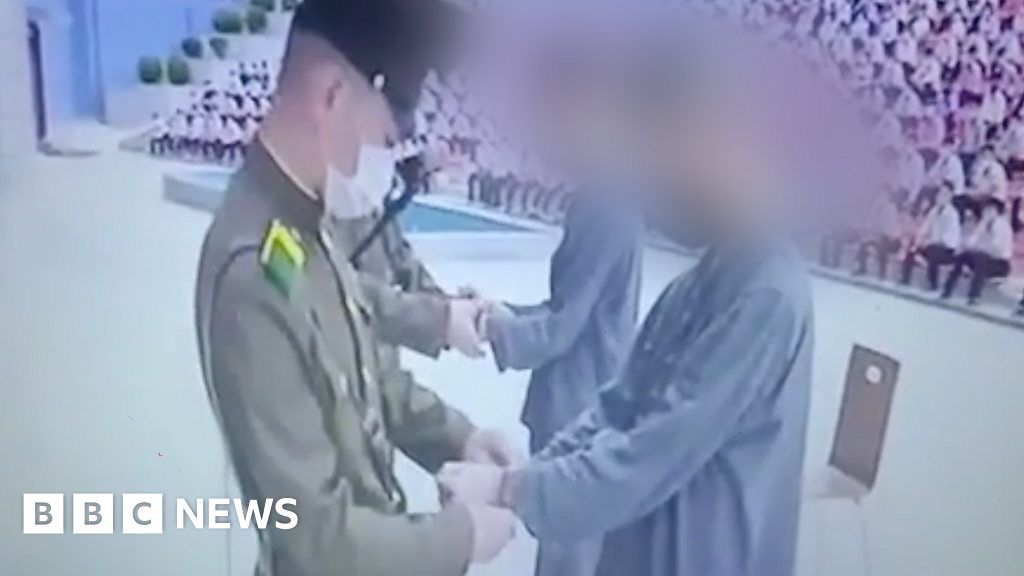In 2020, however, Pyongyang enacted a law to make watching or distributing South Korean entertainment punishable by death.
A defector previously told the BBC that he was forced to watch a 22-year-old man shot to death. He said the man was accused of listening to South Korean music and had shared films from the South with his friend.
Sometimes I forget how lucky I am to have been born in another country. I feel awful about what these poor people have to go through.
@underwire212 imagine that you can tune in on Spotify, YouTube or wherever you want and listen to whatever you want. Imagine that you can legally buy whatever newspaper from the local shop, or go to whatever internet website and legally read whatever news you might find there, whether it is a government website, a conspiracy website, a satirical website or whatever. Legally. That’s what democracy makes it special. This is what freedom is all about.
Here in Romania, during communism, if you were caught listening to Radio Free Europe, you would be prosecuted immediately. If you listened to AC/DC, Beatles, The Doors, Pink Floyd, Sex Pistols, Led Zeppelin or other iconic Rock bands back in the day, you would be labeled as a potential risk for the society, possibly extremist, and followed 24/7 by the secret police. You could have a police record with this, all with this nonsense like what were you wearing, where were you going, what you were doing etc., and it would weigh down hard on your career. Your phones could be tapped, your mail could be tampered, especially if you sent it outside. The secret police was so well infiltrated in the society that anyone could report you. Anyone could be a collaborator, and you wouldn’t be aware of it. Imagine you throw a party, and you make some random jokes about the regime, or that you all listen to one of these bands. In your group of friends, it was enough for just one of them to be a collaborator. You can imagine that all of you might be fucked, the next day if you’re lucky enough, on the spot if not.
There were cases of spouses reporting to the secret police, parents, children, relatives of all sorts. Teachers could be collaborators as well. Priests were known to be collaborators of the secret police, as people would go to confess their sins, and then in turn, they would confess these sins of them to (you guessed it) the secret police. You just couldn’t trust anybody.
It’s just mind-boggling how the secret police (in Romania even aptly named Securitate meaning Security) could follow you for basically nothing. And probably the teens in the article in the OP were in a similar situation.
A friend of mine is from Romania, and I know many who lived in the former GDR (German Democratic Republic). They don’t talk often about it, but when they do their stories seem absurd, hard to believe sometimes that these things happened, and each of these stories is a reason to avoid mass surveillance imo.
Footage without sound from an organization nobody knows.
North Korea’s human rights: What’s not being talked about (2019)
The state controls everything, and actively spies on its citizens using a vast surveillance and informer network.
North Koreans get all their news, entertainment and information from state media, which unfailingly praises the leadership. According to RSF, citizens can be sent to prison for viewing, reading or listening to content provided by international media outlets.
Internet access is available for the elite few in the capital, Pyongyang, who lead relatively comfortable lives. Others may have restricted access. The country has its own very basic intranet - a closed network which certain people are allowed to use.
“North Korea has been said to be the world’s biggest open prison camp,” said Brad Adams [Asia director of Human Rights Watch]. “I don’t think that’s unfair.”
Foreign nationals in North Korea have been arrested and detained for extended periods of time - often kept as prisoners for political reasons and used as diplomatic pawns at opportune moments.
A significant majority of North Koreans undertake unpaid labour at some point in their lives, according to a HRW report. Former students who defected from North Korea told HRW that their schools forced them to work for free on farms twice a year - at ploughing and harvest time - for one month at a time.
Discrimination against women very much exists, but “there isn’t a way to measure inequality in the North like how you measure the wage gap between males and females”, says Arnold Fang [a researcher from Amnesty International]
Reports are also rampant of women facing torture, rape and other sexual abuses while held in detention facilities - and of widespread sexual abuse in the military.



